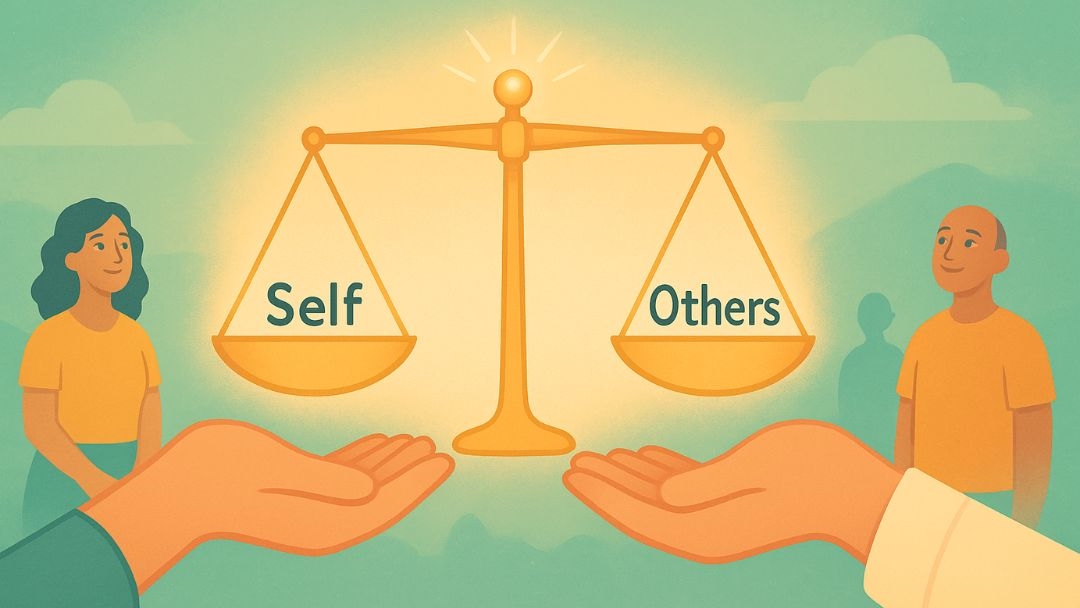How Not to Be a Narcissist: 7 Ways to Build Empathy and Emotional Intelligence
If you’ve ever wondered how to avoid becoming the kind of person who drains others, this guide is for you. We’ll discuss what narcissistic habits look like in everyday life and how to replace them with empathy, humility, and emotional intelligence. So, you can build healthier relationships and a more grounded sense of self.


Back
6 mins read
When a good piece of fruit sits among bad ones for too long, it eventually starts to rot. The same is true for us as humans. We absorb the habits and emotional patterns of the people around us, often without realizing it.
I once worked in an office where the new boss shouted. A lot. Not because he was cruel, but because that’s how he led. At first, everyone went quiet when he raised his voice.
However, after a few weeks, something strange happened. A few team members also started raising their voices. Soon, meetings felt more like battles than conversations. No one was really listening; everyone just wanted to be heard.
That’s how environments work. When empathy is replaced by ego, even good people may begin to harden without realizing it. Narcissistic habits can spread in the same quiet way, through imitation, tension, and emotional self-protection.
Maybe you’ve had that parent with narcissistic traits, or a partner who made you feel invisible. You’ve seen what narcissism looks like, and you’re determined not to end up that way. Or perhaps you have caught yourself showing some of those same traits, and you know it has to stop.
First off, that's something to be proud of. Wanting to grow or to do better than what you’ve seen means you’re already breaking the cycle.
So, how do you ensure that the patterns you grew up with, or see around you, don’t become your own?
Related: What the Care Bears Can Teach Us About Emotional Intelligence
Are You a Narcissist (Or Just Showing Narcissistic Behavior)?

True narcissism refers to a diagnosable personality disorder characterized by an inflated sense of self-importance and a lack of empathy for others.
When you hear the word “narcissist", your mind might jump to extremes. You think of someone loud, arrogant, or manipulative.
But narcissism isn’t always that obvious. Sometimes it’s covert.
It doesn’t just show up in grand gestures or cruel behavior. It hides in subtle moments: the need to be right, the habit of steering conversations back to yourself, or feeling uncomfortable when someone else shines.
Maybe you’ve wondered, “I sometimes act selfish or defensive, am I becoming narcissistic?” The short answer is: probably not.
There’s a big difference between having narcissistic traits and being a narcissist. Narcissistic behaviors are things we all slip into when we feel insecure, unseen, or afraid of losing control. They’re learned habits and they can change.
A narcissist, on the other hand, often lacks the self-awareness or willingness to reflect at all. The very fact that you’re reading this, asking questions, and wanting to grow is proof that you’re already doing what narcissism resists.
Some common traits of narcissistic behavior include:
- An unhealthy sense of self-importance
- Constant need for admiration
- A sense of entitlement
- Difficulty handling criticism
- Lack of empathy
- Tendency to exploit or manipulate others
- Arrogant or dismissive attitudes
- Feeling the need always to be right or validated
- Struggling to listen without planning your response
- Confusing a thirst for control with confidence
- Seeking approval or praise to feel secure
- Feeling uncomfortable when you’re not the center of attention
- Having a hard time apologizing or admitting mistakes
- Feeling drained in relationships where you can’t “perform” or prove your worth
- Struggling to express vulnerability or ask for help
If any one of these shoes fits, it does not automatically mean you’re a narcissist. It simply means there’s space to grow. What’s key here is noticing when that happens and choosing to respond differently.
Practical Steps to Stop Repeating Narcissistic Behaviors

Breaking the cycle of narcissistic behavior will help you relate to others with empathy and humility. And you don't have to shrink yourself to do it. These small, consistent habits can help you grow in that direction:
1. Practice Active Empathy
Empathy isn’t just feeling bad for someone. It’s more. You’re only empathic when you can step into their experience without making it about you. When you really listen with the goal of understanding, not replying.
Before jumping in with your own thoughts or experiences, take a moment to reflect on what you heard.
For instance, if a friend tells you they had a rough day at work, avoid turning it into a comparison like, “You think that’s bad? My day was worse.” Instead, stay curious and ask, “What happened?” Those little moments of genuine interest are what build trust. It’s not always about you.
2. Regulate Your Need for Validation
Everyone likes to feel seen and appreciated. However, when your sense of worth depends on praise, you end up caught up in performance mode.
Maybe you catch yourself checking how many people liked your post, or replaying a conversation in your head to see if you “sounded smart enough.” It’s a normal impulse, but it’s one worth noticing, and noting.
Start by giving what you often seek. Compliment others freely, even when no one’s complimenting you. When you feel that urge for validation rise, pause and remind yourself “I’m enough, even if no one claps for me today.”
Try positive affirmations like, “I’m proud of how I showed up,” or “I’m growing, even if no one notices.” Little by little, you’ll start finding validation from within instead of waiting for it.
3. Learn Humility Without Shame
True humility is being grounded enough to admit when you’re wrong, without letting guilt consume you.
Maybe you snapped at someone and later realized it. Or you gave advice when all the other person wanted was to be heard. Those moments don’t make you weak; they simply show you’re human and you make mistakes.
You can practice this by pausing after a conflict and asking yourself:
- What part of this was mine to own?
- How can I repair instead of retreat?
- What did I learn about myself here?
Owning your mistakes widens your capacity to connect.
4. Set Healthy Emotional Boundaries
Empathy without healthy boundaries is like pouring water into a cup with no bottom. You’ll keep giving until there’s nothing left. Learning where your limit ends (and sticking to it) keeps you emotionally steady.
You can care deeply without carrying someone else’s pain as your own. When you notice yourself over-giving or over-explaining, pause and ask, “Am I doing this out of love or fear?” If it’s love, it will feel open and steady. If it’s fear, it will feel tight, as if you’re earning your worth by being needed.
Always remember that another person’s emotions are their responsibility to process, not yours to rescue.
5. When to Seek Help
Sometimes self-reflection isn’t enough. If certain patterns feel too hard to change on your own, it may mean the roots run deeper.
It may be time to reach out for professional support if:
- You find it hard to connect emotionally, even with people you care about.
- Your relationships often feel one-sided or filled with conflict.
- You notice recurring guilt, detachment, or defensiveness, even after trying to change.
Therapy can help you see where these patterns come from and teach you new ways to relate to others without losing yourself.
A licensed therapist or counselor can offer tools for emotional regulation, self-compassion, and communication that go beyond self-help.
6. Model Emotional Openness with Children
If you’re a parent, caregiver, or someone others look up to, you have the chance to shape what emotional safety looks like. Show that feelings are valid, not inconvenient. Encourage children to talk about emotions without fear of punishment.
Ask questions like, “What made you feel that way?” instead of “Why are you crying again?” Listen with the goal of understanding, not fixing.
Praise effort and kindness, not just achievements. This teaches them that love should be unconditional and not based on performance. Over time, they’ll grow into secure adults who value authenticity over approval, people who can sit and express their emotions instead of hiding behind it.
7. Strengthen Your Emotional Intelligence
I know we discussed empathy earlier. But empathy is just one room in a much bigger house. Emotional intelligence is the whole structure, and to truly grow emotionally, you have to use all the rooms.
Empathy might be the living room where connection happens, but self-awareness is the foundation that keeps everything standing. Without it, we stop noticing how our words or moods affect others. And that’s where narcissistic patterns can quietly take hold.
Emotional intelligence helps you catch yourself before that happens. It’s what helps you pause when your pride flares, own your mistakes without shame, and regulate your emotions instead of projecting them.
When you "use the whole house", not just the room that feels familiar, you build relationships on self-awareness, not ego. That’s how you keep empathy alive and narcissism out.
Becoming the Kind of Person You Needed

Maybe you grew up with someone who couldn’t truly see you. The best way not to repeat that cycle is to learn how to see others and yourself with honesty and compassion.
Change doesn’t begin with grand gestures. It begins with small, consistent choices. One sincere apology. One moment of listening without interrupting. One act of kindness that doesn’t seek praise.
Each time you choose awareness over autopilot, empathy over ego, you begin to heal what once hurt you. You start becoming the kind of person you needed, someone grounded, gentle, and real.
Growth is noticing when you slip up and returning, again and again, to empathy. And one of the best ways to keep growing is by understanding your own emotional intelligence—where your strengths already shine, and where you could use more balance.
Taking an EQ test can help you see those patterns clearly, so you can keep building the kind of self-awareness that leads to genuine connection.


Return to Blog





